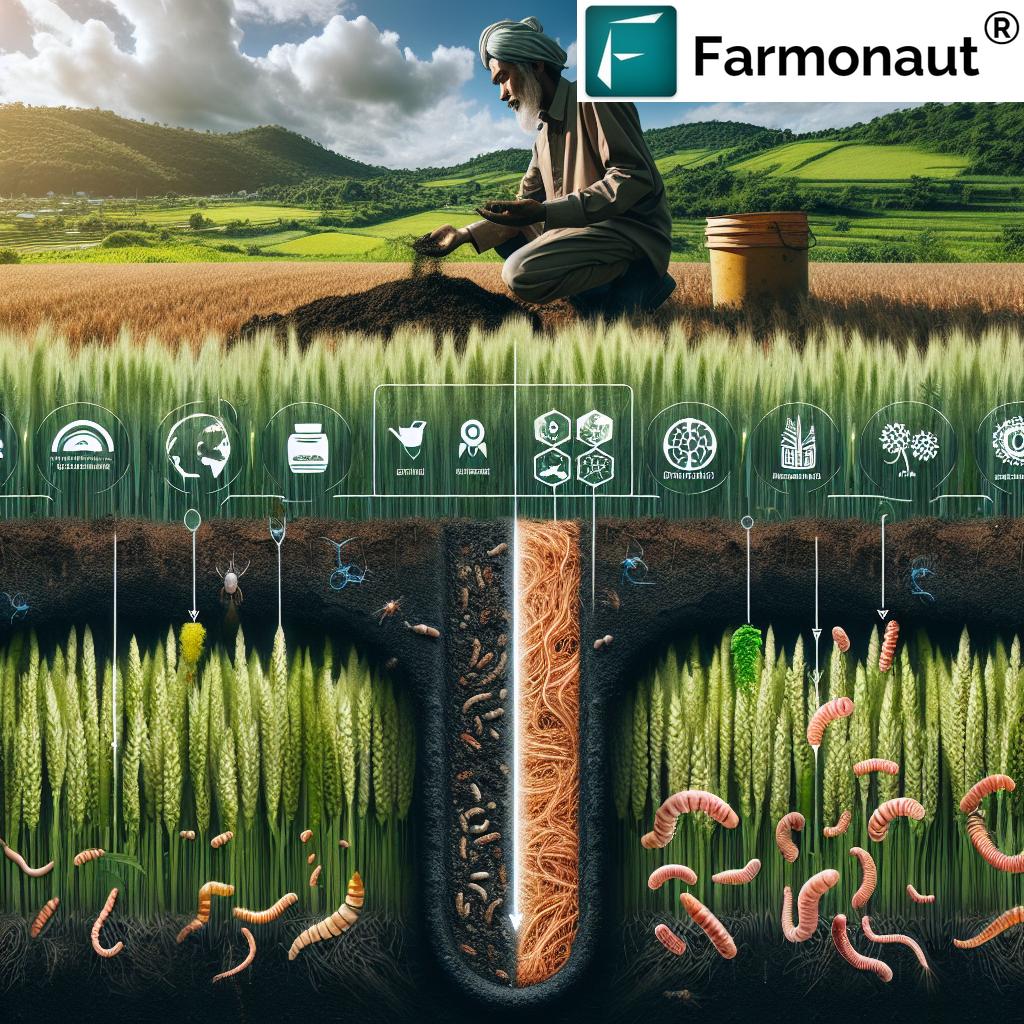India-Australia Agricultural Cooperation: Boosting Sustainable Agritech and Digital Farming Innovations
“India-Australia agricultural cooperation aims to boost crop diversification and achieve self-sufficiency in oilseeds and pulses production.”
In the ever-evolving landscape of global agriculture, we are witnessing a significant milestone in international cooperation. The recent high-level meeting between Indian and Australian officials in New Delhi has set the stage for a new era of collaboration in sustainable agriculture and digital farming innovations. This landmark discussion not only reinforces the long-standing bilateral relationship between these two nations but also paves the way for groundbreaking advancements in the agricultural sector.
As we delve into the details of this momentous dialogue, we’ll explore how this partnership is poised to transform the agricultural landscape, focusing on key areas such as food security, farmer welfare, and cutting-edge agritech innovations. Our comprehensive analysis will shed light on the potential impact of this cooperation on both nations’ agricultural sectors and the global food supply chain.
The Significance of India-Australia Agricultural Cooperation
The meeting between Mr. Philip Green, the Australian High Commissioner, and Dr. Devesh Chaturvedi, Secretary of the Department of Agriculture & Farmers’ Welfare, marks a pivotal moment in the agricultural relations between India and Australia. This high-level engagement underscores the commitment of both nations to strengthen their ties in the agricultural domain, recognizing the sector’s critical role in their respective economies and global food security.
Key aspects of this cooperation include:
- Enhancing food security measures
- Improving farmers’ incomes
- Boosting nutritional security
- Promoting sustainable agriculture in India
- Implementing digital agriculture solutions
- Fostering agritech innovations
This collaboration comes at a crucial time when both countries are facing challenges in agricultural sustainability and productivity. By pooling their resources, knowledge, and technological capabilities, India and Australia are setting a precedent for international agricultural partnerships.

India’s Agricultural Priorities and Initiatives
During the meeting, Dr. Chaturvedi outlined several key priorities that form the backbone of India’s agricultural strategy. These initiatives are designed to address critical challenges and propel the sector towards a more sustainable and productive future.
1. Crop Diversification Strategies
India is placing a strong emphasis on crop diversification as a means to enhance agricultural resilience and farmer incomes. This strategy aims to:
- Reduce dependency on a single crop
- Mitigate risks associated with climate change
- Improve soil health through varied cultivation practices
- Increase biodiversity in agricultural ecosystems
By encouraging farmers to grow a variety of crops, India seeks to create a more stable and sustainable agricultural sector that can better withstand environmental and economic shocks.
2. Promoting Agricultural Exports
Recognizing the potential of Indian agricultural products in the global market, the government is actively promoting agricultural exports. This initiative involves:
- Improving quality standards to meet international requirements
- Developing efficient supply chains for perishable goods
- Negotiating favorable trade agreements with key markets
- Providing support to farmers and exporters for market access
By boosting exports, India aims to increase farmers’ incomes and establish itself as a major player in the global agricultural trade.
3. Achieving Self-Sufficiency in Oilseeds and Pulses
A key focus of India’s agricultural policy is to attain self-sufficiency in oilseeds and pulses production. This goal is crucial for:
- Reducing dependency on imports
- Ensuring food security
- Improving nutritional outcomes for the population
- Boosting domestic agricultural production
The government is implementing various measures, including incentives for farmers, research and development in high-yielding varieties, and improved irrigation facilities to achieve this objective.
4. Enhancing Farmer Producer Organizations (FPOs)
India is placing significant emphasis on the development and strengthening of Farmer Producer Organizations. FPOs play a crucial role in:
- Aggregating small and marginal farmers
- Improving bargaining power in the market
- Facilitating access to modern technologies and inputs
- Enhancing market linkages for better price realization
By promoting FPOs, India aims to empower farmers, especially those with small landholdings, to overcome challenges and improve their economic status.
Technological Advancements in Indian Agriculture
The dialogue between Indian and Australian officials highlighted the critical role of technology in transforming the agricultural landscape. India is making significant strides in integrating cutting-edge technologies into farming practices.
1. Precision Agriculture
Precision farming techniques are gaining traction in India, offering numerous benefits:
- Optimized use of inputs (water, fertilizers, pesticides)
- Improved crop yields and quality
- Reduced environmental impact
- Data-driven decision-making for farmers
Technologies like satellite imagery, drone surveys, and IoT sensors are being employed to provide farmers with accurate, real-time information about their crops and soil conditions.
2. Digital Agriculture Mission
India’s Digital Agriculture Mission is a comprehensive initiative aimed at leveraging digital technologies to transform the agricultural sector. Key components include:
- Creation of a unified farmers database
- Implementation of a farm advisory system
- Development of crop insurance and credit facilities
- Establishment of e-marketplaces for agricultural produce
This mission seeks to create a more transparent, efficient, and farmer-friendly agricultural ecosystem.
3. Agricultural Mechanization for Small Farms
Recognizing the prevalence of small and marginal farmers in India, there is a growing focus on developing and promoting farm mechanization suitable for small landholdings. This initiative aims to:
- Increase productivity and efficiency
- Reduce labor intensity in farming operations
- Improve the timeliness of agricultural operations
- Enhance the quality of farm produce
Custom hiring centers and cooperative models are being promoted to make mechanization accessible and affordable for small farmers.
“The bilateral meeting focused on precision farming techniques and FPO development for over 86% of India’s small farms.”
Australia’s Contribution to the Agricultural Partnership
Australia, with its advanced agricultural sector and research capabilities, brings valuable expertise and resources to this partnership. The Australian High Commissioner, Mr. Philip Green, expressed keen interest in enhancing collaboration across various aspects of agriculture.
1. Agritech Innovations
Australia’s strengths in agricultural technology can significantly benefit Indian agriculture. Areas of potential cooperation include:
- Advanced crop breeding techniques
- Water-efficient irrigation systems
- Precision agriculture tools and software
- Climate-smart agricultural practices
These innovations can help Indian farmers improve productivity while conserving resources and adapting to climate change.
2. Sustainable Farming Practices
Australia’s experience in sustainable agriculture aligns well with India’s goals. Potential areas of collaboration include:
- Conservation agriculture techniques
- Soil health management
- Integrated pest management
- Sustainable water management in agriculture
By sharing knowledge and best practices, both countries can work towards more environmentally friendly and resilient farming systems.
3. Agricultural Research and Development
The partnership opens avenues for collaborative research in various areas:
- Climate-resilient crop varieties
- Biotechnology applications in agriculture
- Post-harvest technologies
- Soil and water conservation techniques
Joint research initiatives can accelerate the development of solutions tailored to the specific needs of both countries.
Enhancing Trade Relations in Agriculture
A crucial aspect of the India-Australia agricultural cooperation is the strengthening of trade ties. Both nations recognized the potential for increased agricultural trade, which can benefit farmers and consumers alike.
1. Market Access
Improving market access for agricultural products is a priority for both countries. This involves:
- Identifying and addressing trade barriers
- Harmonizing food safety and quality standards
- Streamlining quarantine and inspection procedures
- Exploring opportunities for new agricultural exports
Enhanced market access can open up new opportunities for farmers in both countries and contribute to economic growth.
2. Knowledge Exchange in Agricultural Trade
The partnership also focuses on sharing knowledge and best practices in agricultural trade:
- Export promotion strategies
- Supply chain management for perishable goods
- Digital platforms for international agricultural trade
- Risk management in agricultural exports
This exchange can help both countries optimize their agricultural trade processes and expand their global market presence.

The Role of Startups and Innovation
Both India and Australia recognize the crucial role of startups in driving innovation in the agricultural sector. The cooperation between the two countries aims to foster a vibrant ecosystem for agritech startups.
1. Incubation and Acceleration Programs
Joint initiatives to support agritech startups may include:
- Cross-border incubation programs
- Mentorship exchanges
- Access to funding opportunities
- Collaborative research and development projects
These programs can accelerate the development and adoption of innovative solutions in agriculture.
2. Technology Transfer and Commercialization
The partnership aims to facilitate the transfer and commercialization of agricultural technologies:
- Identifying complementary technologies in both countries
- Creating pathways for technology licensing and transfer
- Supporting the adaptation of technologies to local conditions
- Promoting joint ventures between Indian and Australian agritech companies
This collaboration can lead to the rapid deployment of innovative solutions to address agricultural challenges in both nations.
Digital Agriculture: A Key Focus Area
The India-Australia agricultural cooperation places significant emphasis on digital agriculture as a transformative force in the sector. This focus aligns with global trends towards data-driven, precision farming practices.
1. Satellite-Based Crop Monitoring
One of the key areas of collaboration is the use of satellite technology for crop monitoring. This technology offers numerous benefits:
- Real-time crop health assessment
- Early detection of pest and disease outbreaks
- Accurate yield predictions
- Optimization of resource allocation
Companies like Farmonaut are at the forefront of this technology, offering advanced satellite-based farm management solutions. Their platform provides valuable services such as real-time crop health monitoring and AI-based advisory systems, making precision agriculture more accessible to farmers.
2. AI and Machine Learning in Agriculture
The integration of AI and machine learning in agriculture is another focal point of the cooperation:
- Predictive analytics for crop planning
- Automated irrigation systems
- Intelligent pest and disease management
- Personalized farm advisory services
These technologies have the potential to revolutionize farming practices, making them more efficient and sustainable.
Horticulture: A Growing Area of Cooperation
The India-Australia agricultural partnership also recognizes the importance of horticulture as a high-value sector with significant growth potential.
1. Post-Harvest Management
Collaboration in post-harvest technologies is crucial for reducing losses and improving the quality of horticultural produce:
- Advanced storage and packaging solutions
- Cold chain management
- Ripening and preservation technologies
- Quality assurance systems for export markets
These advancements can significantly boost the export potential of horticultural products from both countries.
2. Protected Cultivation Techniques
Sharing knowledge on protected cultivation can enhance productivity and quality in horticulture:
- Greenhouse and polyhouse technologies
- Hydroponics and vertical farming systems
- Climate control systems for protected cultivation
- Precision fertigation techniques
These techniques can help overcome climate-related challenges and extend growing seasons for high-value crops.
Agricultural Machinery: Adapting to Local Needs
The cooperation between India and Australia also extends to the development and adaptation of agricultural machinery suitable for diverse farming conditions.
1. Small Farm Mechanization
Given the prevalence of small farms in India, there’s a focus on developing machinery suitable for smaller landholdings:
- Compact and versatile farm equipment
- Battery-operated tools for small farms
- Multi-crop machines adaptable to different cropping systems
- Affordable and easy-to-maintain equipment
This collaboration can lead to the development of machinery that significantly enhances the productivity of small and marginal farmers.
2. Precision Agriculture Equipment
The partnership also focuses on advanced machinery for precision agriculture:
- GPS-guided tractors and implements
- Variable rate application technology
- Automated harvesting systems
- Drones for crop monitoring and spraying
These technologies can improve the efficiency and sustainability of farming operations in both countries.
Environmental Sustainability and Climate Resilience
A critical aspect of the India-Australia agricultural cooperation is the focus on environmental sustainability and building climate resilience in agriculture.
1. Water-Efficient Agriculture
Given the water scarcity challenges in both countries, there’s a strong emphasis on water-efficient farming practices:
- Drip and sprinkler irrigation systems
- Water harvesting and conservation techniques
- Drought-resistant crop varieties
- Precision irrigation based on soil moisture sensors
These initiatives aim to reduce water consumption in agriculture while maintaining or improving productivity.
2. Climate-Smart Agriculture
The partnership focuses on developing and implementing climate-smart agricultural practices:
- Conservation agriculture techniques
- Agroforestry systems
- Carbon sequestration in agricultural soils
- Crop diversification for climate resilience
These practices can help mitigate the impacts of climate change on agriculture and contribute to reducing greenhouse gas emissions from the sector.
Capacity Building and Skill Development
An essential component of the India-Australia agricultural cooperation is the focus on capacity building and skill development in the agricultural sector.
1. Farmer Training Programs
Joint initiatives for farmer training and education are being explored:
- Exchange programs for farmers and agricultural students
- Online courses on modern farming techniques
- Hands-on training in precision agriculture technologies
- Workshops on sustainable farming practices
These programs aim to equip farmers with the knowledge and skills needed to adopt new technologies and practices.
2. Agricultural Extension Services
Enhancing agricultural extension services is another key area of collaboration:
- Digital platforms for agricultural advisory services
- Mobile apps for disseminating farming information
- Tele-agriculture services for remote areas
- Community-based extension models
Improved extension services can ensure that the latest agricultural innovations reach farmers effectively.
The Way Forward: A Sustainable and Innovative Agricultural Future
The India-Australia agricultural cooperation marks a significant step towards a more sustainable, productive, and innovative agricultural sector in both countries. By leveraging their respective strengths and sharing knowledge and resources, India and Australia are paving the way for a transformative approach to agriculture that addresses global challenges of food security, climate change, and sustainable development.
As this partnership evolves, we can expect to see:
- Increased adoption of precision farming techniques
- More resilient and diversified cropping systems
- Enhanced productivity and income for farmers
- Greater integration of digital technologies in agriculture
- Improved sustainability and environmental stewardship in farming practices
This collaboration not only benefits the agricultural sectors of India and Australia but also sets a model for international cooperation in addressing global agricultural challenges. As we move forward, the innovations and practices developed through this partnership have the potential to influence agricultural practices worldwide, contributing to a more sustainable and food-secure future for all.
Conclusion
The India-Australia agricultural cooperation represents a significant milestone in international agricultural partnerships. By focusing on sustainable agriculture, digital farming innovations, and agritech advancements, this collaboration is set to transform the agricultural landscape in both countries. From crop diversification and precision farming to the development of resilient agricultural systems, the partnership addresses key challenges facing modern agriculture.
As we’ve explored in this comprehensive analysis, the cooperation covers a wide range of areas, including technological advancements, trade relations, environmental sustainability, and capacity building. The emphasis on startups and innovation, particularly in the realm of digital agriculture, positions both countries at the forefront of agricultural technology.
Companies like Farmonaut, with their advanced satellite-based farm management solutions, exemplify the kind of innovative approaches that can emerge from such collaborations. Their technologies, which include real-time crop health monitoring and AI-based advisory systems, align perfectly with the goals of this bilateral partnership.
As we look to the future, the India-Australia agricultural cooperation holds immense promise for not only enhancing food security and farmer welfare in both nations but also for setting new global standards in sustainable and technologically advanced agriculture. This partnership serves as a model for how countries can work together to address the complex challenges facing global agriculture in the 21st century.
FAQs
- What are the main focus areas of the India-Australia agricultural cooperation?
The main focus areas include sustainable agritech, digital farming innovations, crop diversification, precision farming techniques, FPO development, agricultural mechanization, and horticulture advancements. - How does this cooperation aim to benefit farmers?
The cooperation aims to benefit farmers by improving their incomes, enhancing productivity through technology adoption, providing better market access, and promoting sustainable farming practices. - What role do startups play in this agricultural partnership?
Startups play a crucial role in driving innovation, particularly in agritech. The partnership aims to foster a conducive ecosystem for agritech startups through incubation programs, mentorship exchanges, and collaborative R&D projects. - How does digital agriculture feature in this cooperation?
Digital agriculture is a key focus area, with emphasis on satellite-based crop monitoring, AI and machine learning applications in farming, and the development of digital platforms for agricultural advisory services. - What are the environmental sustainability aspects of this partnership?
The partnership focuses on water-efficient agriculture, climate-smart farming practices, conservation agriculture techniques, and the development of climate-resilient crop varieties.
India-Australia Agricultural Cooperation Highlights
| Focus Area | India’s Initiatives | Australia’s Contributions |
|---|---|---|
| Sustainable Agritech |
|
|
| Digital Farming Innovations |
|
|
| Crop Diversification |
|
|
| Precision Farming Techniques |
|
|
| FPO Development |
|
|
| Agricultural Mechanization |
|
|
| Horticulture Advancements |
|
|
| Agritech Startups |
|
|
For those interested in leveraging advanced agricultural technologies, Farmonaut offers cutting-edge solutions:




















